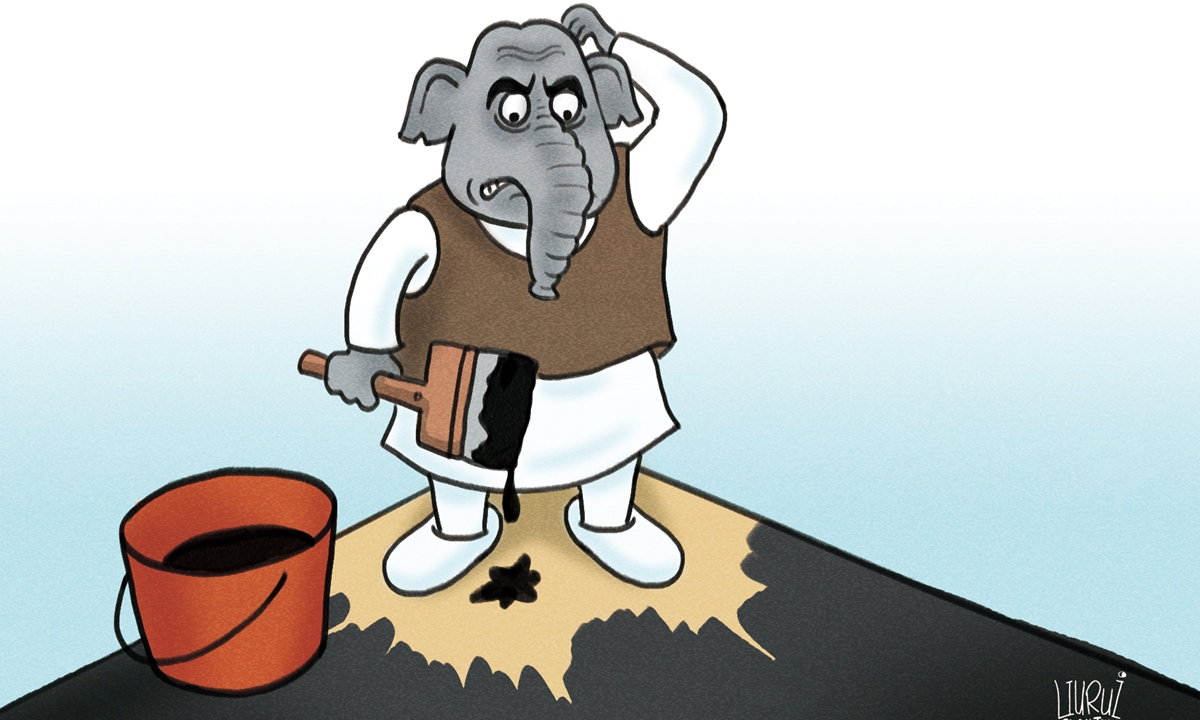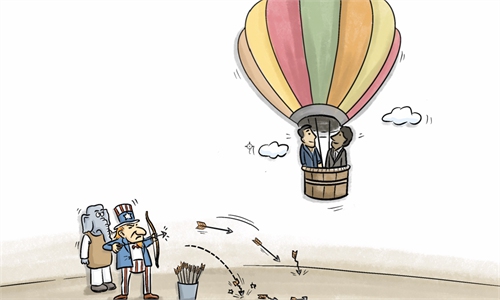
What next for India? Illustration: Liu Rui/GT
New Delhi used to walk a tightrope between Beijing and Washington. But in recent years, it has decided to tilt more toward the US. It has adopted a more hostile policy toward China, and also tried to take advantage of the tensions between Beijing and Washington to advance its geopolitical interests.
However, the recent official engagement of China and the US has released some positive signals about certain improvement of bilateral relations. For India, this could mean a miscalculation, as some Indian scholars are worrying about.
A recent article published in the Indian media outlet The Tribune argues that, "a US re-engagement with China would mean that the leverage New Delhi hopes to exercise from the US-China estrangement will be reduced."
Additionally, the US, UK, and Australia last month have formed a trilateral security partnership called "AUKUS," a pact that doesn't include Japan and India, two other Quad members. This has left these two members of the Quad in a rather awkward position. These all lead to a question: Is New Delhi's strategy aiming in the wrong direction?
Manoj Joshi, the author of this above-mentioned article and a distinguished fellow at the India-based think tank Observer Research Foundation, explained to Global Times that the Indian strategic community to a certain degree has misjudged the China-US relations. According to him, there is not sufficient understanding of the deep ties of trade and investment that interlock the US and China. This, in turn, generates a substantial community of interests between the two.
Lan Jianxue, director of the Department for Asia-Pacific Studies at China Institute of International Studies, also agreed there is a misjudgment of India about the relationship between China and the US. In his opinion, New Delhi might have mistakenly thought that Beijing cannot handle Washington's endless suppression and containment and will eventually surrender to it. And because of this misjudgment, India's foreign policy has deviated from the diplomacy of non-alignment that it had been sticking to for decades.
But New Delhi should not even think about and take advantage of the deteriorated China-US relations to exercise its influence in the first place. "This strategic orientation of India is wrong. The deterioration or some degree of tensions in the China-US relations does not necessarily mean a rise in Indian influence," said Lan.
The outcome of India's misjudgment could be palpable. As a result, New Delhi may not only overestimate its own strength, but also misinterpret China's intentions.
Despite that, Joshi thinks that India doesn't have to adjust its relations with China or the US. According to him, India may have hoped to leverage the estrangement. But that is because of its lack of understanding of the new level of China-US relations, which as the Biden administration says is "strategic competition", not "strategic conflict."
No matter what term the US government uses, Washington is not going to easily abandon its containment policy toward Beijing. This means New Delhi will continue to side with Washington. But in the opinion of Lan, New Delhi is likely to slow down its steps of following the US blindly. "Indians have witnessed how Washington constantly betrays and abandons its allies and partners, especially in Afghanistan. Therefore, now they may reconsider its strategy to see if India's determination to take sides with the US will bring any good to the country's national interests," he commented.
As for the issue over AUKUS that India is concerned about, Joshi agreed that the emergence of the AUKUS will limit the Quad's room to play a role in the region. "If policymakers in India thought that the Quad would be the cutting edge US grouping in the Indo-Pacific, they have been mistaken. It has now been relegated to a distinctly secondary role," said him.
Lan argued that both the AUKUS and the Quad will remain tools in Washington's foreign policy. In his point of view, they will play their roles accordingly to serve the different geostrategic interests of the US. The only difference between the two mechanisms, however, is that the US has more trust in the UK and Australia. After all, both are core allies of the US. Countries like India are more difficult to control. "New Delhi may welcome the AUKUS, regarding it as another trump card against Beijing, but it also needs to understand Washington's distrust of it," said Lan.
The author is reporter with the Global Times. opinion@globaltimes.com.cn

